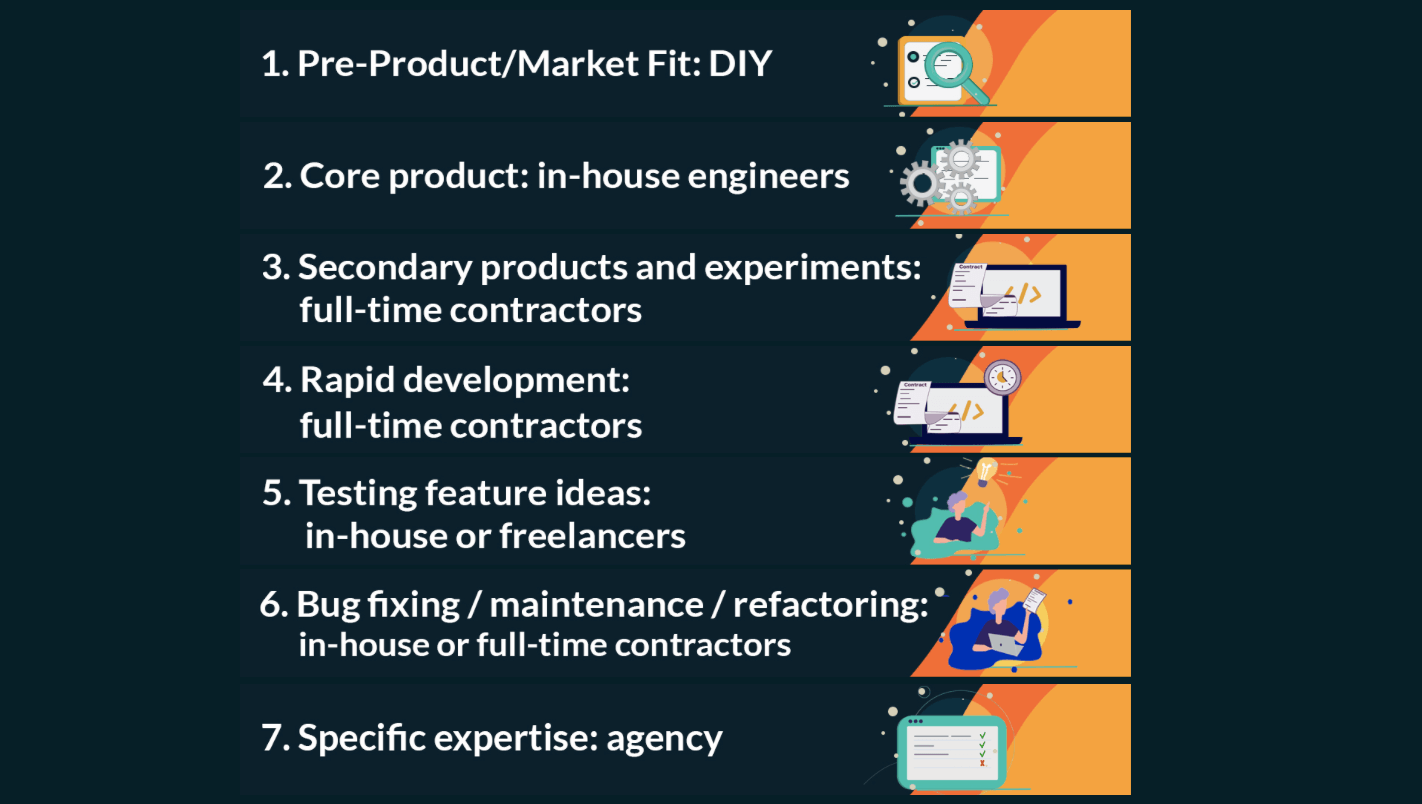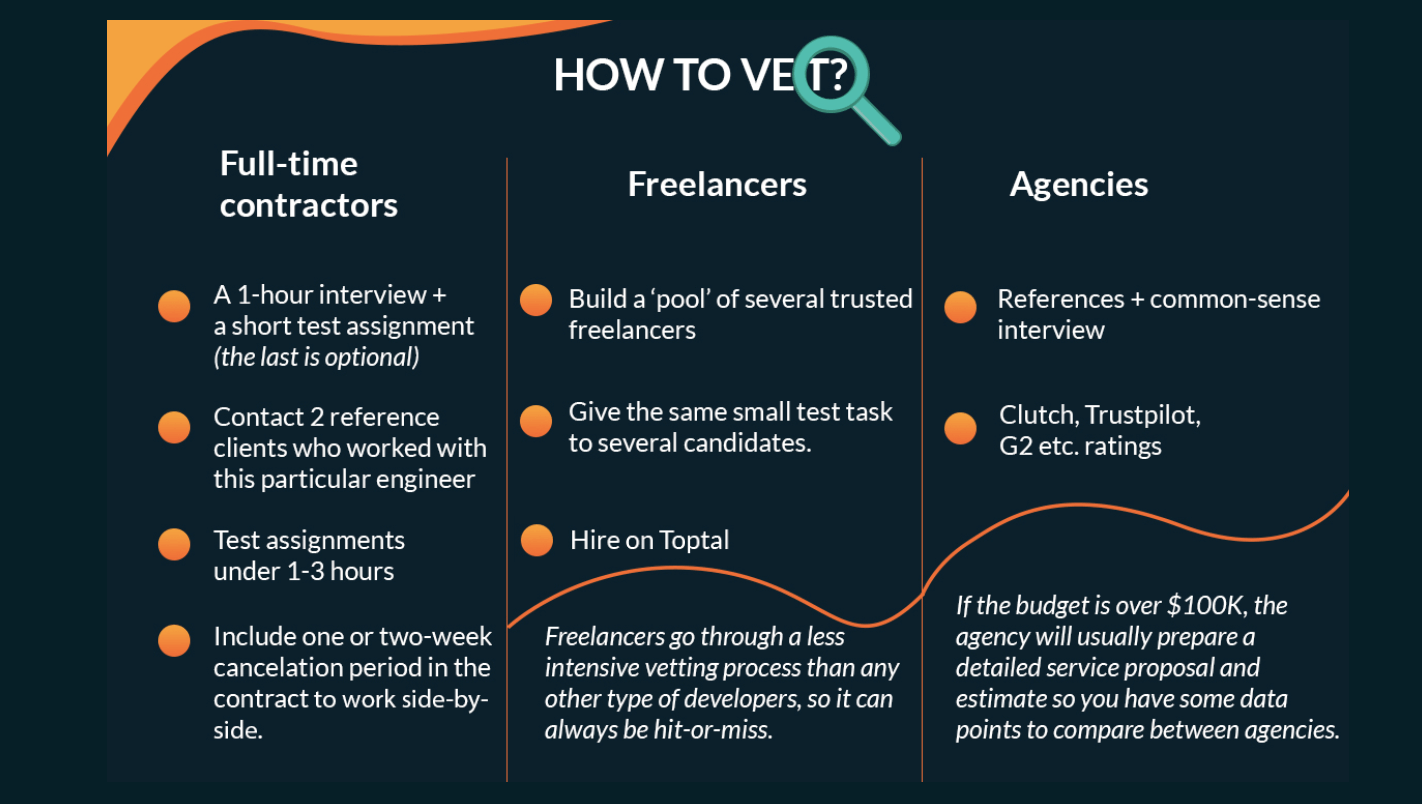In a text version of our December 9th webinar, our featured speaker Yura Riphyak, founder and CEO of YouTeam, shares his discoveries through the lens of his 15 years of experience in outsourcing and staff augmentation.
In this presentation, Yura introduces methods for vetting remote contractors and outsourcing agencies, gives examples of when it is most effective to hire offshore developers, and reveals the hidden additional costs of hiring engineers that may not be obvious at first glance.
Featured Speaker: Yura Riphyak, co-founder and CEO of YouTeam
Moderator: Val Sanin, CRO at YouTeam
Table of Contents
Yura’s 15 years of experience in outsourcing and staff augmentation
Val:
Our speaker today is Yura Riphyak, a Y Combinator alumnus, mentor at the YC startup school, and founder of YouTeam, a first-of-its-kind network of 50,000 engineers from hundreds of development shops across the globe that reached $10 million in gross merchandise value (GMV). Yura is here to share his experience in hiring offshore developers.
Yura:
I assume we may have a diverse audience — some want to approach the seemingly daunting topic of hiring offshore developers, others want to improve their strategy. The world has changed, and things that were niche a few years ago are now becoming mainstream, and hiring offshore developers can be a strategic advantage for companies.
I spent more than 15 years in four different roles in the outsourcing industry. I started an outsourcing consulting company in 2008, and two years later, I started another project and hired a development team from an outsourcing agency because I needed to get things moving quickly. And it was pretty successful — the work that the developers were doing was great. In 2014, I opened a product development and consulting agency. We had a few clients who had the technical expertise and didn’t really need product consulting — they just wanted us to help them find the right developers quickly. Over time, such clients took over the entire balance sheet, accounting for more than half of our profits. This prompted us to move to our current and final form, which is YouTeam, a marketplace for outsourcing engineers.
Why a marketplace is the most effective model for outsourcing software development
Basically, there is the old way of outsourcing, when you sign a contract with one agency. At the same time, if you look at other forms of hiring, they all work through marketplaces, because a marketplace is the most efficient when you need to compare many complex assets and choose the one that works best for you. Outsourcing previously didn’t work for marketplaces because everyone thought engineers needed an office to work. All outsourcing companies developed by having a local presence in certain cities — first, they opened an office, and then they recruited engineers who would work in that office.
Nowadays, engineers prefer to work from home, and they are often more efficient in this setting. As a result, if we redefine outsourcing and move away from the idea of hiring a specific agency, we get a shared pool of talent — all remote engineers from many different agencies — and, therefore, we get a perfect match faster. That’s why YouTeam is an outsourcing marketplace in its current form.
When to and when not to hire offshore engineers
Let’s move on from my biographical remarks to the first topic: why and when to hire offshore engineers.
Let’s say you are the founder of an early-stage startup that is just trying to find a product/market fit. In this scenario, it’s better to do everything yourself. That’s great if you or your co-founder has technical knowledge. However, even if you don’t have a tech background, that doesn’t mean you should give up on all of your hopes. In the last few years, the development of no-code and low-code solutions has reached a new level, and many will be surprised at how far you can get with these tools.
Hiring offshore engineers in the early stages is probably not the best idea because you’ll have to change things often and quickly. Contractors often need time to onboard and re-educate, and they usually need more documentation. Not to say that hiring contractors in the early stages doesn’t make sense at all, it’s just not the best option.
Then, after finding a product/market fit, let’s say you already see things starting to work. Your product needs polishing, because you probably built it yourself. In addition, you still need to change things frequently, and you’d be better off hiring in-house engineers for this work.
Meanwhile, offshore contract engineers are good for specific jobs — when you need to experiment, when you’re further down the path of a startup or a non-venture company, and you have backlogged projects, or if you want to do an integration whose planning horizon is probably a couple of months. You don’t know for sure how long these projects are going to take, so hiring people in-house, spending a couple of months recruiting, and making a huge commitment to integrating them into your team is inefficient. You just don’t know if you’re going to need those talents in the next six to nine months. Therefore, in such cases, it’s better to hire contractors because it’s a faster and more flexible way to close skill gaps.
Another case is startups that have a limited runway and need to move quickly to keep up with demand for the product. That’s exactly where staff augmentation is most effective because contractors are readily available, much easier to replace, and you don’t have to go through a complicated hiring process.
However, when you’re testing feature ideas, you’re probably more likely to hire freelance engineers. We’re talking about small tasks that you don’t want to distract your team with or that they just don’t have time for.
Finally, let’s talk about specific expertise, such as machine learning or data engineering. Specialized software agencies are more likely to succeed in these niches because they have many years of experience in these particular areas. They may have knowledge that will take years for your in-house team to accumulate.


Platforms for hiring offshore contract engineers and development teams
If you’re looking for contractors who work in outsourcing agencies (which is usually the safest way to hire a full-time contractor), YouTeam is the place to go. If you’re looking for individual contractors, however, I would recommend Arc or TopTal platforms based on the quality of their engineers.
Upwork is the first thing that comes to mind if a company needs freelancers for short tasks, but the problem with Upwork is that the best candidates don’t stay there. Many good freelancers leave the platform as soon as they find a customer who offers a stable income, and there’s nothing Upwork can do about it.
Finally, development shops can be found on listings such as Clutch or G2, but it’s important to approach their ratings with a grain of salt because agencies often ask their most loyal clients to rate them. However, it’s still a good signal, especially in the absence of other recommendations — if an agency has received some reviews, it’s probably on good terms with its clients. In other words, the development shop has found at least a few clients who are willing to invest their time in working with it.
How to screen full-time contractors and freelancers
When you hire contractors, you want them to get to work as fast as possible. Of course, during the interview, you check the developer’s key qualities and skills, but an hour-long interview and a test assignment are not enough.
The company can only be sure that the engineer is the right fit by working with the contractor for a while. The best way to check their communication and responsiveness, and how well they get along with the team, is to spend two or three weeks with them doing real work and see how things go. Sometimes during those two or three weeks, you see that the engineer isn’t a good fit, and you replace them with another contractor.
Vetting freelancers is usually harder because you don’t have those two or three weeks. Your entire assignment may take less than two weeks. Companies usually don’t require high skills for small tasks, but the problem is that freelancers can delay the task or disappear altogether. They have to juggle projects, and if they are offered a better deal, they grab it before someone else gets it. That’s why most companies that work with freelancers create a pool of a few reliable, interchangeable engineers.


Software engineer salaries and rates in different countries
Historically, outsourcing has always been more attractive because of lower costs. Today, the difference (between the salaries of in-house developers and remote contractors) is becoming smaller because the market has become more integrated. Such convergence has accelerated because of COVID.
If you look at the hourly rates of full-time contractors and just multiply them by the number of hours, you’ll see that it’s not that big of a difference (compared to in-house developer salaries in the U.S.) Unless you go to the cheapest destinations in Asia like the Philippines, Pakistan, Bangladesh, or some parts of India, where the rates are still very low due to the high number of engineers and low demand.
In addition, the rates went up significantly in the COVID era, and now they’re adjusting because of market conditions, but not as fast. Salaries don’t like to go down — it’s a much harder, much slower process that usually moves in small, hesitant steps. So it is still a lot more expensive to hire a developer now than it was before COVID three years ago.
Hiring costs
In addition to rates and salaries, companies should consider additional costs — commissions, fees, and indirect costs such as time to find candidates or agencies.
When you hire in-house engineers, you pay job boards commission and cover administrative and recruiting costs. If you hire an agency, these costs are already included.
With full-time contractors, on the other hand, there are two options. The first is a flat fee per developer, which usually ranges from $1,500 to $3,000 per month. The second option is an agency margin. However, many agencies are not transparent about this margin, so clients have a crisis of trust.
Browse 500+ Dev Teams Available for Hire
The most common pitfalls of hiring offshore engineers and tips on how to avoid them
The problem with outsourcing is its bad reputation among some clients, which has yet to be gotten rid of. An agency can sell you its junior developer for a higher premium, which essentially maximizes the agency’s margin. Such developers make more money and therefore invest more in marketing and salaries of sales development representatives (SDRs) who overload your inbox with spam. This is how they attract new clients, and you need time to figure out if the engineer is actually good or bad.
That engineer may delegate work to junior specialists, while you may still think this guy does all the coding. It’s fine if you don’t notice a difference if the processes within the company are running smoothly. However, sometimes they’re not. By the time you figure it out, the cost of replacing the specialist becomes quite high, and terminating a partnership with such an engineer can be unpleasant.
So, the most common pitfall of hiring a contract engineer is that someone else may be doing the job, and someone less qualified might be behind that handsome, nice guy who speaks excellent English.
Unfortunately, the bad apples of the industry keep selling such developers to maximize profits. Let’s see how to deal with them. In fact, the best position to hire contract engineers is when you have your own technical expertise. That means that your team has a CTO or VP of Engineering who runs daily standups and monitors commits and pull requests. That kind of person notices even a small change in performance and code quality, and the agency will have a much harder time selling him an underperforming engineer.
Another problem with full-time contractors can be that they are moonlighting side projects. People are saying in online chat comments that in-house engineers do this as well.
There have been many instances of people working full-time for multiple companies, especially when the market was overheated in 2021 and early 2022. Switching between projects ultimately affects code quality, so again, having someone with a technical background on the team is the best way to spot such changes.
Some agencies have another insidious tactic — first, they cut prices heavily and then increase the budget. The dynamics of such a relationship are that the longer you work with this agency, the more you depend on it, and the more expensive it will be for you to replace it — because of how much you have already invested in it. So if you find engineers with rates significantly lower than the market, for no obvious reason, that should be a wake-up call. You don’t have to be blinded by that.
Val:
Yura, I appreciate you sharing your experience with us. Thank you everyone for attending our webinar and have a great weekend!
Our YouTeam webinar series is designed for technology and HR leaders to help them stay updated on the latest hiring market trends, the future of remote work, and ultimately help them attract and find the right talent. We invite industry experts to share their experiences in hiring and managing remote teams. Go to our webinar page to register for upcoming activities and view recordings of past events.
Additional resources
Platforms for hiring full-time contractors
- Arc – Freelancers and remote software developers for full-time positions
- Howdy – A platform for building and managing development teams in LatAm
- YouTeam – A marketplace for on-demand engineering staff augmentation
- Terminal – A talent platform for startups
- TopTal – A network of freelance talent







